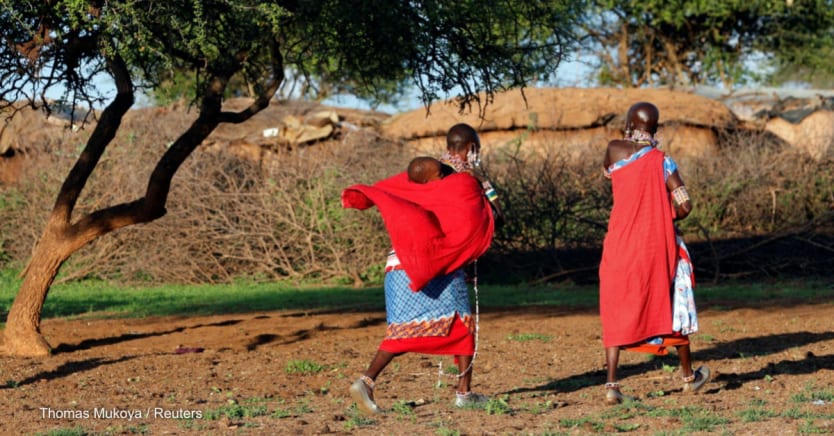
Faced with a looming threat of eviction from Ngorongoro district in northern Tanzania, Masai people, clad in their traditional shukas of various shades of red and blue, congregated for prayers in the plains of the Ngorongoro Conservation Area last month.
This was the second time they were meeting since they got news of the government’s intentions to evict them from the Ngorongoro Conservation Area to make way for a tourism project. In January, they held demonstrations in Loliondo, one of the three divisions in the district.
Both Ngorongoro Conservation Area and Loliondo are within Ngorongoro district in Tanzania’s Serengeti ecosystem, which also includes the Serengeti National Park. The Masai Indigenous people have known the area as their ancestral land, coexisting with wildlife for generations.
According to the Oakland Institute, an independent policy think tank, this year the government threatened to evict over 70,000 Masai from Loliondo and the Ngorongoro Conservation Area to make way for a wildlife corridor. The land central to the current dispute is a 1,500 square kilometer (580 square mile) portion that would be used for trophy hunting and tourism by the United Arab Emirates-based Otterlo Business Corporation — a game hunting company that has been licensed in Loliondo since 1992.
Anuradha Mittal, the founder and executive director of the Oakland Institute, said high-income countries such as the UAE and western organizations such as UNESCO are to blame for the current dispute.
“It is about rich countries still thinking of Africa as their hunting grounds and Africans and Indigenous people as dispensable,” she said. “It is shameful that UNESCO is part of it. … It should delist Ngorongoro Conservation Area as a World Heritage Site.”
Ngorongoro Conservation Area was inscribed as a World Heritage Site in 1979 due to its natural and cultural endowment. In 2010, important archaeological sites in the area were recognized, and in 2018, Ngorongoro Lengai, which is also a part of Ngorongoro, was listed as a UNESCO Global Geopark.
With these designations came restrictions against the Masai’s utilization of the land, which include the prohibition of permanent structures and crop farming, according to community leaders.
Tirso Dos Santos, head of office and UNESCO representative to Tanzania, said he could not comment on the issue as it has been referred to their global office.
The eviction has received overwhelming support from members of the Tanzanian Parliament who said that it is in the public interest.
“We are not stakeholders in conservation. Conservation for us is not an initiative; it is a way of life.”
— Samwel Nangiria, a resident of Loliondo in Tanzania’s Ngorongoro districtAt a meeting with the pastoralists, Prime Minister Kassim Majaliwa said experts were concerned by the growing number of livestock kept by the Masai in the area, which poses a threat to the sustainability of wildlife and tourism — through which “the government earns billion of shillings used to facilitate development of other sectors and provision of social services.”
In 2019, tourism was Tanzania’s largest foreign exchange earner, the second-largest contributor to the gross domestic product, and the third-largest contributor to employment.
So far, the Masai have put up a spirited fight against the restrictions. In 2018, the East Africa Court of Justice granted an injunction prohibiting the government from evicting the Masai from the area. The injunction also prohibited the destruction of Masai homesteads and the confiscation of livestock and banned the police from harassing and intimidating them. But Tanzania has since withdrawn from the East Africa Court of Justice.
But Joseph Shangay, a resident of Ngorongoro Conservation Area and a human rights lawyer said the government has continued to harass the Masai who are being restricted from making developments to their homes within the Ngorongoro area. He said the community is now considering taking the case to the African Commission on Human and Peoples' Rights.
Mittal said that the Oakland Institute has also reached out to the United Nations and special rapporteurs on the case, and is looking at applying for an emergency petition to fast track the case.
Avaaz, the world’s largest online petition platform, has also picked up the Masai case, and so far, according to Sarah Morrison, campaign director at Avaaz, 3 million people globally have signed the petition opposing the evictions.
The petition was issued to President Samia Suluhu’s senior staff in Brussels last month and raised hope for the community.
“We are not stakeholders in conservation. Conservation for us is not an initiative; it is a way of life,” said Samwel Nangiria, a resident of Loliondo. “Over 80% of the MP’s do not understand what is happening here. They are using the parliament as a platform to enact laws that will punish the Masai instead of coming to the ground to speak to us.”
Search for articles
Most Read
- 1
- 2
- 3
- 4
- 5
